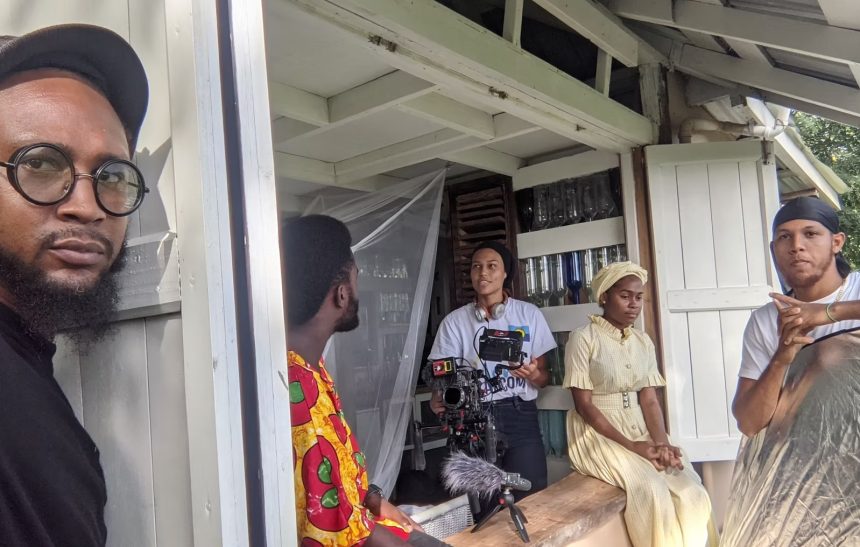At CARIFESTA XV in Barbados, seven Vincentian films were screened—a milestone that should have been a cause for national celebration. Yet not one Vincentian filmmaker was included in the official delegation, and no government officials attended the screenings. I was the only Vincentian invited, hired to teach filmmaking workshops, and I carried the responsibility alone of representing my country and promoting our stories.
My films are award-winning, recognized internationally for storytelling. Madulu, The Seaman won Best Short Documentary at the 18th Festival Internacional de Cine de Gibara in Cuba and has been featured on the Criterion Channel. Sugarlands has screened in the UK, Honduras, and Wales, where it contributes to academic discussions on history, reparations, and indigenous recovery. At this very moment, UNESCO is promoting me across the Caribbean and Europe, positioning both myself and SVG on the global stage.
During the broadcast of WEFM99.9 radio program Issue at Hand, Joel Providence and Cecil Ryan asked key questions about the state of filmmaking in SVG. Here’s my perspective:
Q: Did you meet international figures like Ava DuVernay?
A: No. I was facilitating a workshop during her event, flown in by the Barbadian team—not SVG’s delegation. But I did reconnect with some amazing creatives: Asha Lovelace from the Caribbean Film Festival in Trinidad, filmmaker Yao Ramsar, my long-time collaborator Rivillino Simmons, Dr. Keith Nurse, Messhida from the Grenada Film Festival, and Akin Omotoso — the Bajan–Nigerian bossman behind some of my favorites on Netflix and Disney+ (Marked, The Brave Ones, Rise).
Q: Do SVG filmmakers get enough support?
A: Not at all. The Ministry of Culture often seems disconnected, claiming they “don’t know” filmmakers or our work. I self-fund most of my projects, yet my films have screened in Cuba, Wales, USA, Switzerland, Indonesia, Canada, Honduras, the UK, and on the Criterion Channel. Tolga Akcayli’s Too Lickrish won Best Comedy Film in France and streams on Amazon. Hairouna Film Festival, founded in 2017, thrives despite minimal state support. I am visible globally but invisible at home—because there is no real support, infrastructure, or strategy.
Q: Can CARIFESTA spur a Caribbean film industry revival?
A: Absolutely. Barbados recognized my expertise and flew me in to teach. They didn’t realize I didn’t have support from my own country. Over the next six months, Barbados will roll out workshops to boost local filmmaking. The Grand Market has even been transformed into an art space, and Barbados is acquiring archival footage. SVG could do the same, with regional funding from Afreximbank, the Caribbean Development Bank, and UNESCO.
SVG has already proven its global appeal. Ridley Scott filmed White Squall here, Disney shot Pirates of the Caribbean, and most recently, a MrBeast production. My award-winning films show that Vincentian stories resonate worldwide.
Q: Should SVG host CARIFESTA?
A: Yes, but only with serious investment. Hosting requires logistics—accommodation, transport, rehearsal spaces, and funding. A well-executed CARIFESTA could boost tourism, trade, and cultural diplomacy, but scale and planning matter.
Q: How does film benefit communities beyond economics?
A: Film is a tool for confronting crime, addressing trauma, and promoting mental health. It strengthens identity, builds resilience, and offers young people alternatives to destructive paths.
The Path Forward
To transform tokenism into tangible growth, I suggest:
Establishing a National Film Commission with filmmaker representation
Introducing tax incentives and production rebates to attract local and international projects
Streamlining permits and investing in production-ready spaces and archives
Supporting training, mentorship, and equipment access for emerging filmmakers
Developing regional and global partnerships with CDB, Afreximbank, UNESCO, and other organizations
The question is simple: do we see film as an industry worth supporting, or will we continue letting others define the value of our stories? I have shown that Vincentian filmmakers can compete and win internationally.
Now SVG has the chance to build an industry that creates jobs, strengthens communities, and positions our stories on the world stage.


